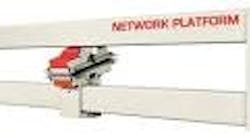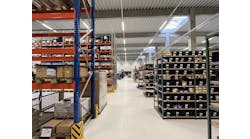What a difference a new DCS makes! At least according to Rand-Whitney Containerboard. They had an increasingly obsolescent DCS and needed increased production, faster product and grade changes, improved quality and overall equipment effectiveness (OEE). Competitive pressure was coming to bear on the older systems in the plant. Rand-Whitney Containerboard had two goals when it decided to replace the distributed control system at its Connecticut mill - system reliability and a good relationship with the new vendor. But according to Rand-Whitney, ABB and System 800xA have delivered a lot more.
Rand-Whitney Containerboard produces 250,000 tons a year of containerboard at its mill in Montville, Connecticut in the United States. When the mill’s distributed control system (DCS) became obsolete and system support grew increasingly difficult to obtain, Rand-Whitney knew it would have to replace the outdated system. The company formed a team to compare control systems from different suppliers and assess how those systems would work in the mill environment.
The team was looking for an automation solution that would have the capabilities needed to deliver reliable performance day after day. And they wanted a trustworthy vendor they could build a good relationship with - one that would provide outstanding service.
ABB System 800xA and Paper Quality Scanner for Rand-Whitney Containerboard
Having assessed the various systems and suppliers, the team decided to order an ABB System 800xA solution with a quality control scanner and paper machine optimization controls. The team was impressed by System 800xA’s integrated approach, which would work well with the mill’s complex work and communication flow. But the decision finally came down to deciding which vendor the mill most wanted to work with side-by-side. Rand-Whitney selected ABB because it offered the best package of people, equipment and software, as well as the best partnership.
Rand-Whitney sells its products in a highly competitive market. By producing a consistently high quality sheet and keeping costs down, Rand-Whitney has found a winning formula for remaining competitive. The mill produces two board grades and operates on a tight and exacting schedule. Any supply chain interruptions can swiftly multiply into problems that affect customers and the mill. This makes equipment reliability critically important.
Mike Quattromani, the chief financial officer of the Kraft Group, which owns Rand-Whitney, was very involved in the DCS purchase. He challenged the Rand-Whitney team to do everything with the new system that ABB said it could do. And the team has more than responded to his call.
They have used the system’s functions effectively to make significant production gains. Rand-Whitney can now perform grade and product type changes 35 percent faster and enjoy a 35 percent faster recovery rate from sheet breaks. This has contributed to an increase in production from an average of 31 tons per hour a few years ago to 36 tons per hour now.
The new system has already exceeded the mill planning team’s expectations. Rand-Whitney has achieved a 20 percent weight profile improvement, 22 percent moisture profile improvement using 39 percent less water from a remoisturizing actuator, and 18 percent fewer quality losses. And it is benefiting from a 3 percent improvement in overall machine effectiveness as well as a 1.2 year return on investment.
Even customers have detected the difference. Rand-Whitney is finding that they prefer its board over others, thereby meeting one of Rand-Whitney’s most important goals.





